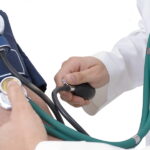By Bonnie Jenkins, Advanced Natural Wellness
Hypertension – more commonly known as high blood pressure, affects about 27% of all Americans. It’s the first step in the quiet decent towards heart disease and stroke. In fact, according to the American Heart Association, high blood pressure was directly linked to 44,435 deaths in 1998 and indirectly responsible for another 210,000 deaths.
I had always assumed that high blood pressure was primarily a man’s disease. Imagine my surprise when my doctor told me that hypertension is actually more common in women beginning at age 50. And since high blood pressure rarely shows any symptoms, unless your doctor monitors your blood pressure on a regular basis, it’s easy to miss — until it’s too late. A 50-year study by the National Heart, Lung and Blood Institute (NHLBI), known as the Framingham Heart Study, found that half of all people who have suffered a first heart attack and two-thirds of first-time stroke victims also had moderate to high blood pressure. What’s more, left untreated, high blood pressure can increase the risk of atherosclerosis, aneurysm, loss of vision and kidney failure.
High blood pressure is a condition that occurs when the pressure inside your large arteries is too high. When blood pressure reaches 140/90 or above on a consistent basis, you have high blood pressure. What do the numbers mean? The top number, or systolic pressure (pronounced sis-tah-lick), represents the peak pressure generated in your arteries when your heart beats. The bottom number, or diastolic pressure (pronounced die-as-tah-lick), indicates the pressure when your heart is at rest between heartbeats. Although 95% of all cases have no identifiable cause, experts speculate that an unhealthy lifestyle may contribute, or even cause, hypertension.
Give Hypertension A Triple Whammy!
MD Exposes the Hidden Danger to Your Eyes

When your eyesight starts to fail, it's a real problem. Suddenly you can't go to the grocery store... you can't get to the doctor if you have an emergency... you can't meet your friends for dinner…
Your "regular" doctor doesn't have time to keep up with the latest research. And the same goes for eye doctors. They go to school to learn how to fit you for glasses and contacts, but have no way of preventing the damage and loss of eyesight that threatens your freedom and independence.
Let me show you something that explains a LOT about how your eyes work.
In my FREE Special Report, I'll show you a HUGE, untapped resource for your eyes that safely and naturally restores clear, effortless eyesight.
Click here to get started...
For decades, the most common recommendation for patients with high blood pressure was to eat less salt. While reducing your salt consumption may help, several studies show that increasing your intake of potassium, magnesium and coenzyme Q-10 (CoQ-10) may have an even more favorable impact on your blood pressure.
Potassium not only helps regulate blood pressure, it boosts overall cardiovascular health and reduces the risk of stroke. According to a study by Glenfield Hospital in Leicester, England, even modest increases in dietary potassium can significantly lower your blood pressure, particularly if you are over 65. Try adding bananas, baked potatoes, orange juice and other potassium-rich foods to your diet. To make sure you consume the recommended 2,500 to 3,200 mg. of potassium each day, you can also take a potassium supplement, which can lower systolic blood pressure an average of 12 points and diastolic pressure an average of 16 points.
Magnesium is another mineral that may impact blood pressure. At least ten independent clinical studies have shown that patients with hypertension have, on average, magnesium levels at least a 15% lower than people with normal blood pressure. Some studies suggest that supplementing your diet with 400 mg. of magnesium may help prevent or lower high blood pressure.
Coenzyme Q-10 (CoQ-10) may also help lower blood pressure. Several studies have shown that regular supplementation with 60 mg. of CoQ-10 three times a day lowers blood pressure in four to twelve weeks. But the benefits don’t stop there. CoQ-10 also appears to reduce blood triglycerides and insulin while slightly increasing HDL (good) cholesterol levels.
Are You Suffering From...
- Love handles and a pot belly
- Romance that isn't what it used to
- Forgetfulness and inattention
- Low (or no) strength and endurance
- A sex drive that's shifted into neutral...or worse
If so...you may have Mature Male Burnout. Click here to discover more about this unique condition and what you can do about it.
Do It With Diet
Perhaps the biggest breakthrough in lowering blood pressure without the use of prescription medicine came with a study known as DASH (Dietary Approaches to Stop Hypertension). Funded by NHLBI and the National Institutes of Health, the multi-center study tracked 459 adults with blood pressure just under 160/95 over the course of eleven weeks. After a control period of three weeks, the patients were randomly divided into three groups — one fed the standard high sodium, high fat American diet, the second a diet high in fruits and vegetables, and the third a combination diet rich in fruits, vegetables and low-fat dairy products (the DASH diet). While the second group had a modest reduction in blood pressure, the study found that the combination diet lowered both systolic and diastolic blood pressure by a whopping 11.4 and 5.5 points respectively. And the benefits came quickly — many of the patients on the combination diet lowered their blood pressure within two weeks.
The DASH diet is low in saturated fat and rich in whole grains, fruits and vegetables. Similar to the diet found in Mediterranean cultures, DASH also includes nuts, seeds, legumes, and is supplemented by non- or low-fat dairy products. Moderate amounts of protein — in the form of fish, poultry and soy — are also allowed.
One Last Thing . . .
As if you really need another reason to adopt a healthier lifestyle, the National Heart, Lung and Blood Institute just created a new classification for high blood pressure – prehypertension. The agency estimates that as many as 45 million Americans – more than one-fifth of adults – have this precursor to high blood pressure. The new classification includes people with a systolic press of less than 120mm Hg and a diastolic pressure of less than 80 mmHg based on new findings that damage to the arteries begins at fairly low blood pressure levels – those formally considered normal and optimal.
If you’ve been diagnosed with higher than normal blood pressure, discuss the treatment options with your doctor. Unless your readings are dangerously high, you may be able to take control of your blood pressure with these safe and simple lifestyle changes.
References:
Berthon N, et al. “Magnesium supplementation and deoxycorticosterone acetate–salt hypertension: effect on arterial mechanical properties and on activity of endothelin-1.” Canadian Journal of Physiology and Pharmacology. 2002; 80:553-561.
Ibrahim HN, et al. “Role of dietary potassium in the hyperaldosteronism and hypertension of the remnant kidney model.” Journal of the American Society of Nephrology. 2000; 11:625-631.
McCarty MF. “Coenzyme Q versus hypertension: does CoQ decrease endothelial superoxide generation?” Med Hypotheses 1999; 53:300-304.
Sacks FM, et al. “Effects on blood pressure of reduced dietary sodium and the Dietary Approaches to Stop Hypertension (DASH) diet. DASH-Sodium Collaborative Research Group.” New England Journal of Medicine. 2001; 344:3-10.






